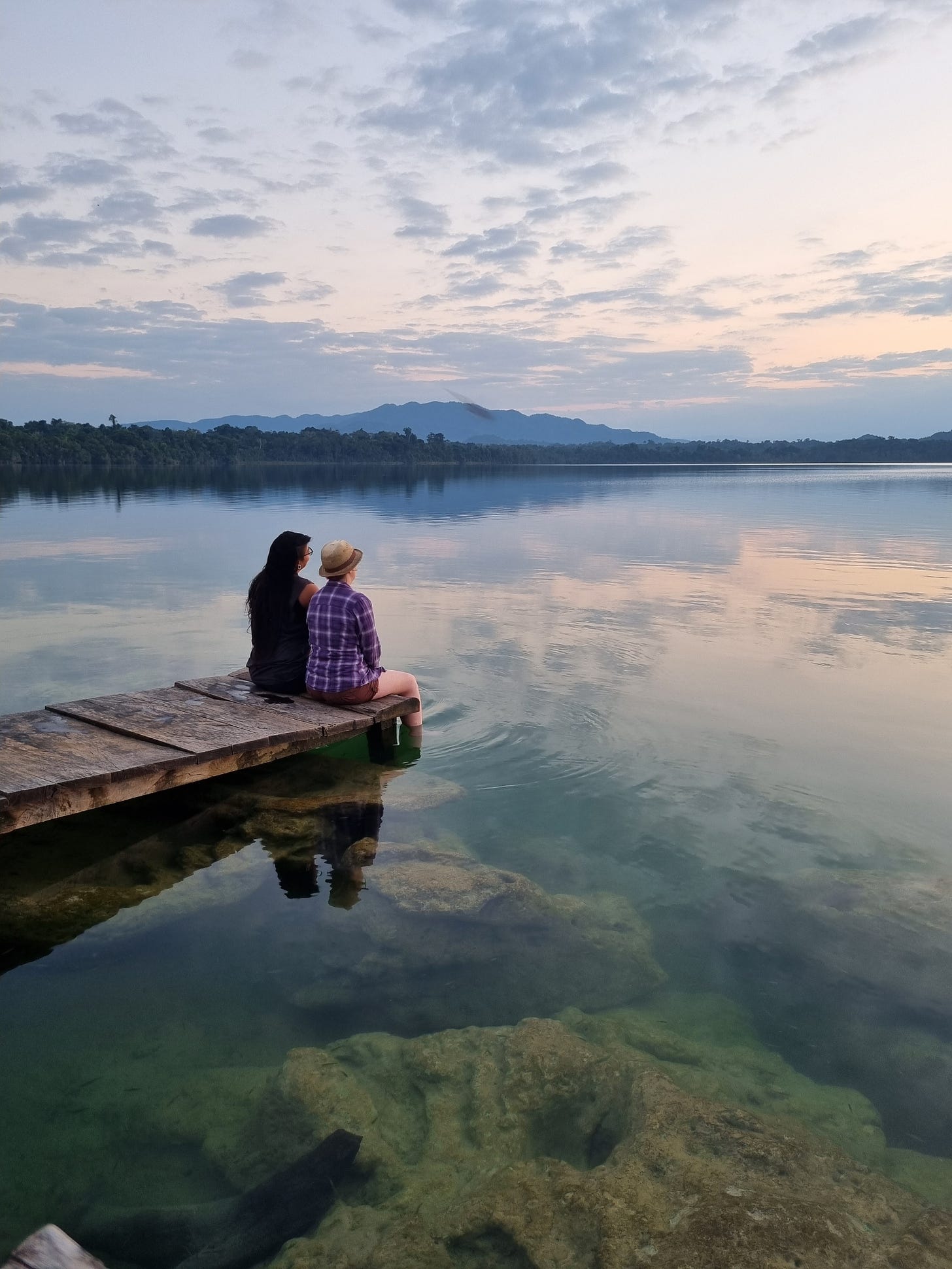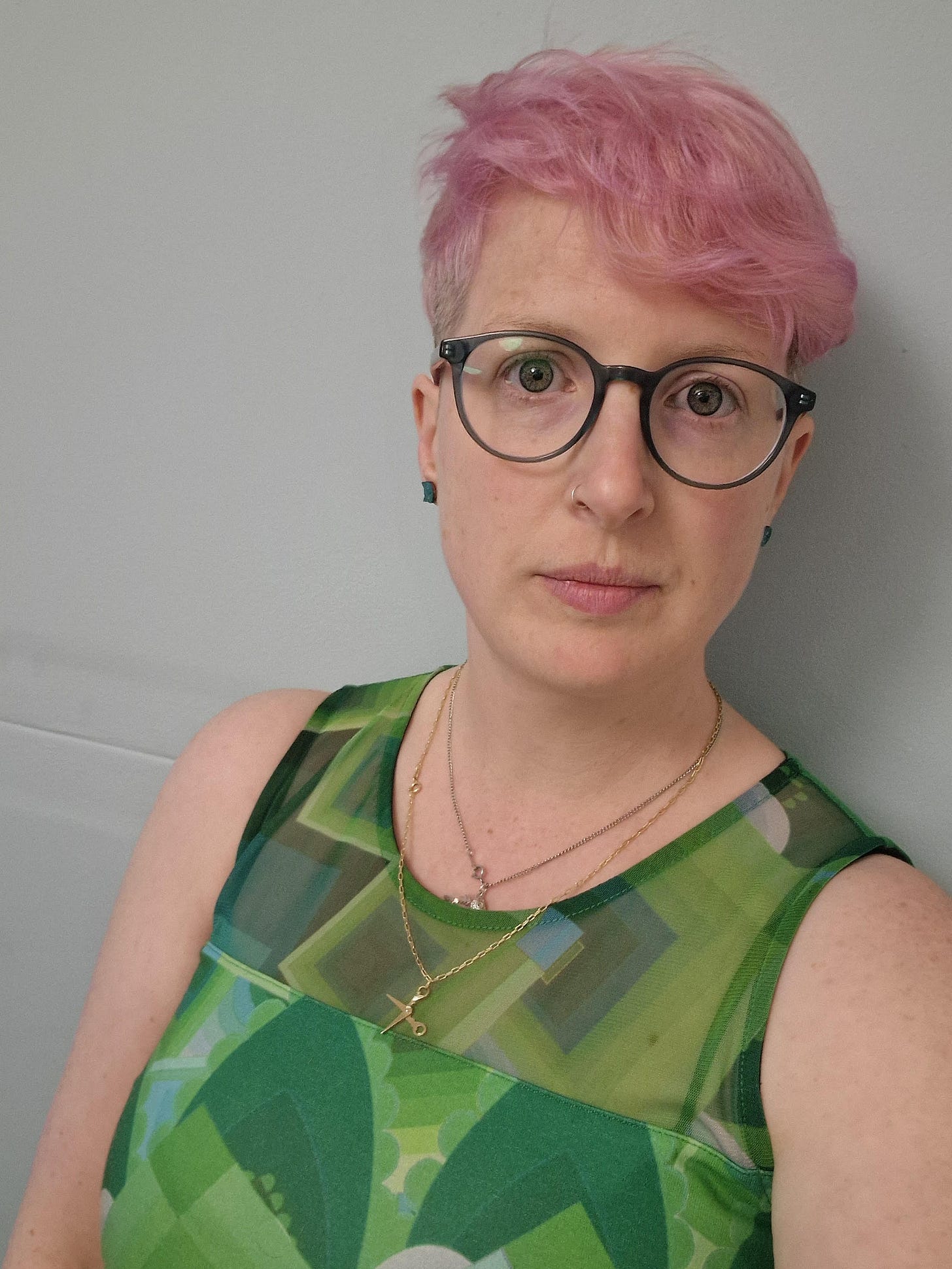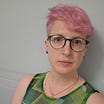Hello and welcome to Healing is My Special Interest, the newsletter at the intersection of late diagnosed neurodivergence and healing from high control environments. This week I published a chapter I have been working on for MONTHS on the ways religious authoritarian parenting methods create children who are vulnerable to predators. It’s not a fun topic but we honestly all need to be aware of the patterns of predators in Christian spaces so please read it if you are able to:
Today I am so excited to keep the pride theme going (why do we just have to focus on June?!?!?) and publish this wonderful personal essay by Aisling Walsh on deconstructing compulsory heterosexuality (be sure to check out her newsletter here). As religious authoritarians continue their assault on queer people simply existing, I think personal essays like this one are ever more important. Here’s to being a later-in-life queer/autistic and to resisting fascism simply by being our true selves! Thank you so much to everyone who reads, subscribes, and shares this content and enables me to keep this newsletter going.
Recovering Heterosexual
A guest post by Aisling Walsh
After we had been seeing each other for about two years, my partner asked me: ‘What had it felt like to be a respectable heterosexual?’ We were scrambling over slippery rocks at a Guatemalan national park at the time and, like most of their questions, this inquiry was so out of the blue that I lost my footing and nearly fell into the lake.
I wasn’t sure how to answer. Despite 35 years of attempting to perform heterosexuality, the way I had seen it performed by friends, family, in movies, music, TV shows, books and teen magazines, my track record attested to the fact that I had never been a very successful heterosexual. M_, on the other hand, had never even attempted to maintain this façade knowing, since they were an early teen, that they were exclusively attracted to girls. Having faced significant social stigma and rejection throughout their life for being queer, M was curious to know what it had been like to enjoy and then consciously choose to give-up the social acceptability that comes from heterosexuality by coming out at 35.
As I scrambled for an answer that might satisfy their curiosity, an answer to a question I had never quite dared to ask myself, I tried to explain how there wasn’t one day when I simply woke up and decided I was queer. Rather there was a long process of allowing myself to shed my need for social acceptability by embracing queerness. And, as the conversation progressed, it became clearer to me than ever that my heterosexuality had been nothing but a mask, a way to seek acceptance and belonging in a world where I felt eternally out of place and experienced consistent rejection for my (undiagnosed) neurodivergence.
I’ve always been an astute observer, even if I don’t always fully comprehend what I’m seeing. As a child, I must have realised (correctly) that the key to social acceptance for people who identify as women, is to belong to a man. To have boyfriends, but not too many, before progressing into marriage with a man was presented in books, TV, movies and music as the pinnacle of female achievement, something to long for and aspire to. And most, if not all of, my peers and the adults in my life reflected this belief in their attitudes and practices. As I became more aware and self-conscious of the ways I consistently failed to understand and meet social expectations or to fit in, I latched onto heterosexuality as a drowning victim might grab a lifebuoy. This was only possible because I’m attracted to people of all genders and therefore could, for the longest time, pretend to myself and the world that I was exclusively interested in cis, straight men. I hoped that one day, with the right man, I might finally find the social approval, acceptance, and belonging I so deeply craved.
*
I had felt different for almost as long as I can remember, though I rarely grasped what exactly it was that set me apart from other girls and boys. Was it my atheist upbringing in the fanatically Catholic Ireland of the 1980s and 1990s? The fact that my parents were, for many years, the only parents in my school who had separated? (Divorce was illegal in Ireland until 1997!) My staunchly feminist mother who modelled my own early rejection of imposed gender norms? In a deeply conservative social context those markers of difference certainly explained many of the ways I felt out of step with my peers. But I suspected there was something more going on, something fundamentally flawed at the core of my being.
As a child I felt constantly pulled between what was expected of me as a girl and my own interests, which sometimes coincided, but more often diverged, from respectable femininity. I loved Lego but mostly built miniature houses for my even more beloved Barbies, the only ‘girl’ dolls that ever interested me. I hated dresses but spent years resenting the fact that my atheist parents had thwarted my chance of parading around as cream puff for my Holy Communion. I was terribly shy but incredibly opinionated and would not, or could not, keep my thoughts to myself. Teachers hated but tolerated my outspokenness because I got good grades. I struggled to make friends but could stumble into intense friendships with other girls that often blew up in my face. I had a rebellious streak but became extremely anxious at the idea of breaking the rules. I was terribly conscious of the way I looked but could not get a grip on fashion, make-up, or hair. After many ill-advised attempts at imitating teenage girls from real life as well as movies and TV, I opted for a gender-neutral buzz cut, grungy t-shirts and jeans, with scuffed Doc Martens. Having failed at pretty, I tried to be edgy. I hoped that boys would be lured by my ‘strange and unusual’ persona modelled after Wednesday Addams and Lydia Deetz.
This rarely proved to be the case. ‘Weirdo… nerd… know-it-all… swot… freak…worrier’ were just some of the labels boys and girls liked to hurl or sneer at me throughout primary and secondary school. I would pretend to ignore or else laugh off the insults in public, reciting the ‘sticks-and-stones’ mantra to myself. But alone at night I replayed the incidents in my mind, adding the latest accusation to an ever-expanding mental file entitled All the Things Wrong With Me according to an ever-expanding list of family, friends, teachers, classmates and, occasionally, boys.
As I got older, further labels such as ‘Difficult… Standoffish… Rude… Intimidating…’ were added by colleagues, casual acquaintances, public servants and supermarket employees. With such a weight of archival evidence against me, it was logical to believe I was all those things, even as I tried so hard to be their opposite. And, in failing so completely, I added many of my own labels: ‘Boring… fat… ugly… awkward… shy… clumsy… lazy.’ I was certain I would never, could never, be considered fun, easy-going, attractive, desirable, or lovable.
Inching towards my 20s, I continued to fail in the arts of seduction. I often wished for a clear signaling system for exchanging unambiguous indications of interest with potential matches. Traffic light parties were an unknown entity in early ‘00s Ireland and smartphones, never mind ‘The Apps’, had yet to be invented. I hovered at the edges of clubs, bars, and friend groups, watching from behind my pint of Guinness, as the women around me succeeded at maintaining lingering eye contact, smiled at the appropriate moments, laughed on cue and left with another conquest on their arm. Flirting, dating, and staying in relationships seemed to be happening to everyone around me. They hooked up and broke up with an ease that felt beyond my reach.
I was taciturn and forthright and it was not in my nature to placate men. I was considered flirtatious when I didn’t mean to be, but froze or fled if I perceived anyone to be flirting with me. I took negging at face value and got into arguments with men who tried to antagonise me. A boyfriend once told me I was intimidating. It was meant as a compliment and I understood it as such, but this rare admission hinted at my propensity to scare men away because I was never very good at pretending to be someone I’m not. The suspicion there was something not-quite-right about me grew stronger and I began to wonder if I was broken somehow. Did I project some kind of man-repelling aura I was neither aware, nor in-control, of?
The spells of involuntary celibacy throughout my 20s, stretching from one to two years, were broken by short and explosive adventures. I would mould myself into whatever shape I thought the object of my affection wanted, in the hopes they would not see the real me lurking underneath. Shortly after moving to Guatemala in 2014 I fell for the allure of an aging poet. Basking in an oasis of connection, social recognition and belonging, it felt like I had arrived at a destination I had believed would always remain out of reach. Having learned from the earliest age to doubt my own feelings and perception of the world, I ignored the violent outbursts, the gaslighting and my increasing unhappiness. The fear of discovery and the certainty that this was the best I could hope for, and far more than I deserved, kept me clinging to the relationship well beyond its expiry date. When my masks inevitably slipped the poet provided his own labels: ‘clingy… hysterical… controlling… neurotic.’
It took nearly five years to extricate myself from this emotional entanglement, which was spurred by a growing awareness of, and need to explore, my own queerness. By the time I was single again, in January 2020, ‘The Apps’ had become the center of our dating worlds. I created profiles on multiple platforms, determined to cast a transatlantic net across all genders. For the first time in my life, I had the power at my fingertips to swipe over those excruciating moments of flirting with strangers in noisy bars or the uncertainty of trying to figure out if there was a romantic spark with friends.
The fallacy of my heterosexuality was proven almost as soon as I decided to give up on it. Just over a year after coming out, I met and fell in love with the person who would become my spouse. We were together about four months when I went through the autism diagnosis process, and I discovered that I wasn’t the broken, empty shell of a human being I had believed myself to be.
I was excited to finally have an explanation for things which had confused me my whole life and to discover I was part of a wide and thriving neurodivergent community after so many years of feeling disconnected, isolated, and like I didn’t belong anywhere or with anyone. I started to try on the autistic label, and found it fit quite well. The more I understood about neurodivergence, the more I began to like, rather than fear, its application. There was much joy, and some pain, as I began to understand myself and my life in this new way.
It's no coincidence that stepping out of one closet – heterosexuality – allowed me to find my way through an ever deeper and darker neurotypical closet. The former was much easier to recognize than the latter, and yet it was my undiagnosed autism which stopped me, for 35 years, from embracing my queerness. I had clung to a false heterosexual identity hoping that this, and the security of a relationship, would ease the sense of unbelonging and brokenness which had haunted me for most of my life and grant me entrance into a world of “normality” and acceptance.
I was wrong, of course. It was discovering my autistic identity that has finally allowed me to find some peace in self-acceptance, where the only person I need to belong is myself.
Aisling Walsh (she/her) is an award winning writer and researcher based in the west of Ireland. Her work has been published in New Island's 'Wired Our Own Way' anthology, the 2024 'From the Well' anthology, The Guardian, Al Jazeera, The Irish Times, Jezebel, Electric Literature, Literary Hub and others. She writes a regular newsletter, AutCasts, on movies and neurodivergence.









Thanks DL for providing a home for my words, among very illustrious company!
Ohhhhh I can relate to so much of this. Being outspoken/opinionated in school but also really smart and tolerated by teachers. Such a good girl but also rebellious. Men being intimidated by me. Not great at beauty/fashion and trying to figure out whether to care or rebel. Etc etc etc. Thank you so much for sharing!